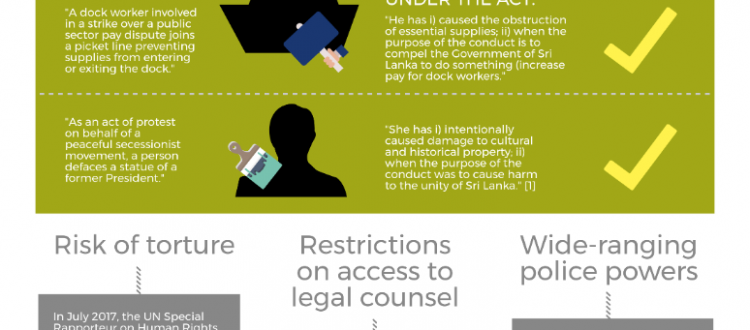Old wine in new bottles – Sri Lanka’s latest counter-terrorism proposals
The Sri Lanka Campaign published an infographic explainer based upon a statement of findings by the UN Special Rapporteur (SR) on Human Rights and Counter Terrorism, Ben Emmerson QC.
| Suggested Reading | Conflict Background | GCCT |
By the Sri Lanka Campaign for Peace and Justice
In July, the UN Special Rapporteur (SR) on Human Rights and Counter Terrorism, Ben Emmerson QC, issued a statement of findings upon the conclusion of his visit to Sri Lanka. You can read it in full here.
The statement begins with a hard-hitting assessment of the government’s record on delivering the broad range of measures needed to bring about a just and sustainable peace, including those commitments contained within Human Rights Council 30/1 (co-sponsored by the government of Sri Lanka in 2015). “Progress in achieving the key goals set out in the Resolution” the SR concludes, “is not only slow, but seems to have ground to a virtual halt. None of the measures so far adopted to fulfil Sri Lanka’s transitional justice commitments are adequate to ensure real progress, and there is little evidence that perpetrators of war crimes committed by members of the Sri Lankan armed forces are bring brought to justice”.
The statement goes on to address ongoing human rights violations under the Prevention of Terrorism Act (PTA), a draconian piece of legislation that has been used by successive governments as a tool of repression and intimidation, overwhelmingly against members of the Tamil population. The PTA, the SR writes, has “fostered the endemic and systematic use of torture” in Sri Lanka, with over 80 percent of those most recently arrested under the PTA in late 2016 complaining of torture and physical ill-treatment following arrest.
As to the government’s latest draft counter-terrorism proposals designed to replace the PTA, the Counter-Terrorism Act (CTA), the SR finds a number of “central flaws” in the draft framework, “which, if enacted, would guarantee the continued violation of the human rights of terrorism suspects”. These include – as outlined in a recent independent legal analysis published by the Foundation for Human Rights – provisions preserving the admissibility of confessions, as well as overly broad definitions of terrorism which would allow the legislation to be used in situations “far removed from acts of real terrorism”.
The Sri Lanka Campaign published an infographic explainer, based on some of this independent analysis as well as the findings of the SR, in order to decipher the contents of the CTA and highlight the continued risks of serious abuse that it poses. You can read it below, or here as a PDF. Please help spread the word, and ensure that this dangerous legislation never becomes law, by sharing it on social media today.
The Sri Lanka Campaign for Peace and Justice is a member of the Global Coalition for Conflict Transformation, which is comprised of organizations committed to upholding and implementing the Principles of Conflict Transformation.
This article was originally published on the Sri Lanka Campaign website and is available by clicking here. The views expressed do not necessarily represent those of TransConflict.




















